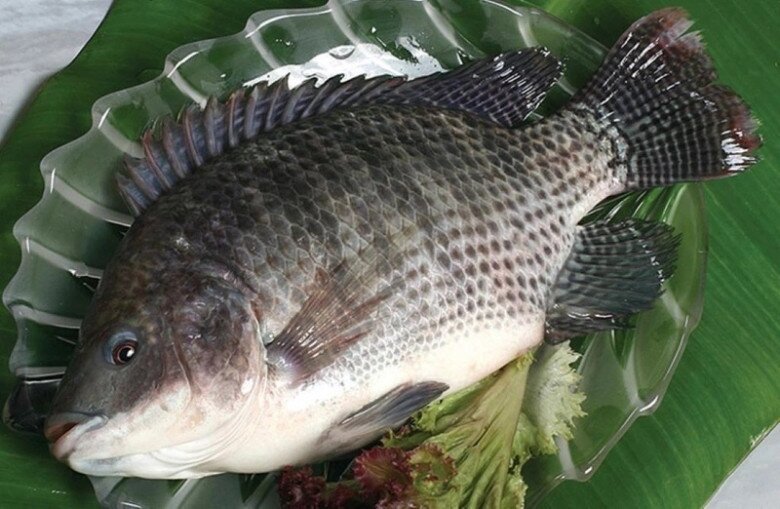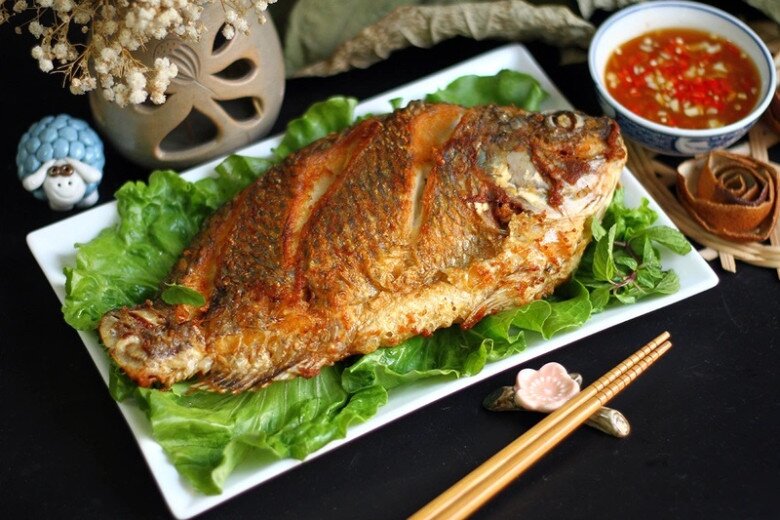Tilapia is a resilient and fast-growing fish species that thrives in crowded conditions. Its diet is cost-effective, contributing to the fish’s overall affordability compared to other freshwater seafood.
In traditional Chinese medicine, tilapia is believed to have a sweet and neutral taste, with no toxicity. It is said to tonify blood and qi, benefit the spleen and kidneys, and nourish the bones and joints.

Tilapia is highly nutritious and, at times, remarkably inexpensive, costing as little as 20,000 VND per kilogram.
According to Minh Phuc, a renowned traditional medicine practitioner and former Vice Chairman of Vung Tau City’s Oriental Medicine Association, scientific research has revealed that tilapia is rich in vitamins, minerals, protein, omega-3 fatty acids, selenium, phosphorus, potassium, vitamin B12, niacin, vitamin B6, and pantothenic acid. These nutrients are essential for overall health. As such, tilapia is recommended for the elderly suffering from memory loss, malnourished and underdeveloped children, individuals with anemia, aches and pains, diabetes, high blood pressure, and general debility.
Associate Professor Dr. Nguyen Duy Thinh, from the Institute of Biotechnology and Food Technology at Hanoi University of Technology, affirms that tilapia contains significant levels of Omega-3 fatty acids EPA and DHA, which reduce inflammation and benefit cardiovascular health and brain function. It is also an excellent source of vitamin D, boosting immunity and bone health. The vitamin B12 content in tilapia helps combat anemia, fatigue, muscle weakness, gastrointestinal issues, and supports nerve damage and psychological disorders.
Nutritious Tilapia Recipes
For Memory Loss and Blood Deficiency: Prepare a hot pot with tilapia, pork bones, straw mushrooms, shiitake mushrooms, tomatoes, tofu, pineapples, tomatoes, scallions, lily flowers, bean sprouts, and seasonings. This dish tonifies blood and qi, benefits the five viscera, and boosts antibodies. It is suitable for treating blood deficiency, fatigue, headaches, dizziness, aches and pains, and external and internal injuries.
For Malnourished and Underdeveloped Children: Cook tilapia with high-quality rice, mung beans, scallions, coriander, ginger, onions, fish sauce, and seasonings. Steam the tilapia and fry it with scallions. Cook the rice into porridge, adding the fish and seasonings. This dish tonifies the spleen and stomach, nourishes blood and qi, and benefits the five viscera. It is beneficial for those with blood and qi deficiency, underdeveloped children, and adults who have difficulty gaining weight.
For Joint Pain: Braise tilapia with piper sarmentosum leaves, onions, pepper, fish sauce, and seasonings. This dish nourishes blood and qi, benefits the spleen and kidneys, and eliminates dampness. It is effective for treating rheumatic pains, muscle and tendon weakness.

Tilapia can be prepared in various ways, including frying, braising, boiling, and hot pot.
For High Blood Pressure: Simmer tilapia with scallions, shallots, pepper, fish sauce, salt, oil, and seasonings. This dish strengthens the spleen, transforms phlegm, benefits dampness, and lowers blood pressure. It is helpful for headaches, dizziness, insomnia, age-related memory loss, and debility.
For Diabetes: Cook tilapia with Chinese cabbage, ginger, onions, fish sauce, salt, oil, and seasonings. Steam or grill the tilapia, then fry it with scallions and cook it into a soup. This dish tonifies blood and qi and strengthens the spleen and kidneys. It is beneficial for spleen and stomach deficiency, poor appetite, and diabetes.
For Postpartum Women with Poor Appetite and Low Milk Supply: Braise tilapia with pork hock, turmeric, shallots, sugar, pepper, fish sauce, salt, and seasonings. This dish tonifies the spleen and stomach, nourishes blood and qi, and promotes lactation. It is suitable for spleen deficiency, fatigue due to protein deficiency.
For Anemia and Fatigue: Cook tilapia with tomatoes, pineapples, plums, bean sprouts, water celery, scallions, chili peppers, fish sauce, and seasonings. This dish tonifies blood and qi, benefits the spleen and kidneys, and treats debility, jaundice, and damp-heat conditions.
Precautions when consuming tilapia
Tilapia contains lean protein, vitamins, and minerals. However, compared to other fish like salmon, tilapia has higher levels of omega-6 fatty acids, which can lead to inflammation in the body. Therefore, individuals with kidney problems should consume tilapia in moderation.
For safety, consume only the meat of the tilapia, discarding the head, gills, intestines, and stomach. Avoid eating tilapia too frequently, and maintain a varied diet with different protein sources.





































